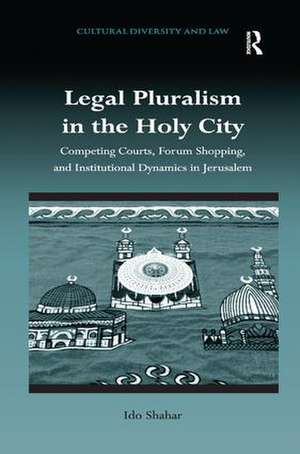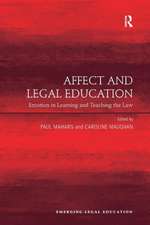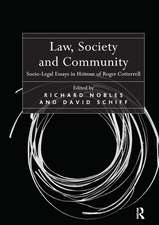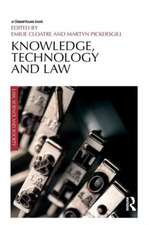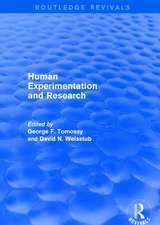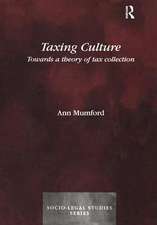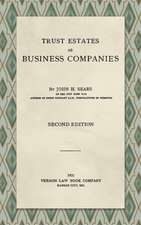Legal Pluralism in the Holy City: Competing Courts, Forum Shopping, and Institutional Dynamics in Jerusalem: Cultural Diversity and Law
Autor Ido Shaharen Limba Engleză Hardback – 28 iul 2015
| Toate formatele și edițiile | Preț | Express |
|---|---|---|
| Paperback (1) | 489.26 lei 6-8 săpt. | |
| Taylor & Francis – 11 ian 2017 | 489.26 lei 6-8 săpt. | |
| Hardback (1) | 1005.01 lei 6-8 săpt. | |
| Taylor & Francis – 28 iul 2015 | 1005.01 lei 6-8 săpt. |
Din seria Cultural Diversity and Law
-
 Preț: 469.34 lei
Preț: 469.34 lei -
 Preț: 489.26 lei
Preț: 489.26 lei -
 Preț: 489.26 lei
Preț: 489.26 lei -
 Preț: 469.34 lei
Preț: 469.34 lei - 13%
 Preț: 338.33 lei
Preț: 338.33 lei -
 Preț: 469.34 lei
Preț: 469.34 lei - 13%
 Preț: 338.33 lei
Preț: 338.33 lei -
 Preț: 469.34 lei
Preț: 469.34 lei - 17%
 Preț: 259.98 lei
Preț: 259.98 lei - 17%
 Preț: 259.98 lei
Preț: 259.98 lei -
 Preț: 489.26 lei
Preț: 489.26 lei - 17%
 Preț: 259.92 lei
Preț: 259.92 lei - 17%
 Preț: 259.98 lei
Preț: 259.98 lei -
 Preț: 489.26 lei
Preț: 489.26 lei - 13%
 Preț: 338.33 lei
Preț: 338.33 lei - 13%
 Preț: 338.33 lei
Preț: 338.33 lei -
 Preț: 389.66 lei
Preț: 389.66 lei -
 Preț: 389.66 lei
Preț: 389.66 lei - 17%
 Preț: 256.87 lei
Preț: 256.87 lei - 17%
 Preț: 258.70 lei
Preț: 258.70 lei -
 Preț: 388.34 lei
Preț: 388.34 lei - 18%
 Preț: 1000.27 lei
Preț: 1000.27 lei
Preț: 1005.01 lei
Preț vechi: 1225.61 lei
-18% Nou
Puncte Express: 1508
Preț estimativ în valută:
192.33€ • 200.54$ • 159.85£
192.33€ • 200.54$ • 159.85£
Carte tipărită la comandă
Livrare economică 21 martie-04 aprilie
Preluare comenzi: 021 569.72.76
Specificații
ISBN-13: 9781409410522
ISBN-10: 1409410528
Pagini: 240
Dimensiuni: 156 x 234 x 14 mm
Greutate: 0.59 kg
Ediția:Revised edition
Editura: Taylor & Francis
Colecția Routledge
Seria Cultural Diversity and Law
Locul publicării:Oxford, United Kingdom
ISBN-10: 1409410528
Pagini: 240
Dimensiuni: 156 x 234 x 14 mm
Greutate: 0.59 kg
Ediția:Revised edition
Editura: Taylor & Francis
Colecția Routledge
Seria Cultural Diversity and Law
Locul publicării:Oxford, United Kingdom
Notă biografică
Ido Shahar is Assistant Professor at the Department of Middle Eastern History, University of Haifa. He is a legal anthropologist and a social historian, specializing in the study of shari'a courts and of Palestinian society. He has published extensively on legal pluralism, on shari'a courts in Israel, and on Palestinians in Israel.
Recenzii
"Drawing on participant observation and textual and legal analyses, Shahar describes and analyzes a lively shari’a court in contemporary West Jerusalem, which belongs to the Israeli legal system but serves Palestinian residents of the eastern part of the city. A major focus is the intertwined jurisdictional, organizational, and humanitarian issues facing the court, including the intersection of the court with non-Israeli Palestinian and Jordanian shari’a courts in East Jerusalem."
Law and Social Inquiry Journal
’Legal Pluralism in the Holy City is a ground-breaking contribution to the study of co-existing and intersecting legal systems in contemporary Jerusalem, within the context of the raging national conflict in the city and in surrounding Palestine. It provides Shahar with a vantage point from which he contributes to the theory of legal pluralism in a subtle way. I have no doubt this book will be an important read for both academics and practitioners interested in law-in-action, legal pluralism, Islamic law and the Israeli-Palestinian conflict.’ Baudouin Dupret, CNRS, France, and Centre Jacques-Berque, Morocco ’With convincing detail and insightful analysis Shahar demonstrates the resilience and creativity of Jerusalem’s Muslim courts. Never avoiding the political realities or fieldwork challenges, he clarifies with originality and telling examples the intertwined jurisdictional, organizational and humanitarian issues facing the Muslim courts in Israel and, by implication, throughout the Muslim world.’ Lawrence Rosen, Princeton University, USA ’Shahar gives us a detailed ethnography of a complex set of legal fields, including an Israeli shari’a court in West Jerusalem and two non-Israeli shari’a courts in East Jerusalem. Through detailed accounts of everyday life in the court and illustrative cases, he traces processes of inter-court competition, women’s demands for law reform, and innovations undertaken by the shari’a judges. An important contribution to legal ethnography and the social study of Islamic law.’ John R. Bowen, Washington University in St. Louis, USA, and author of Can Islam be French and Blaming Islam ’Shahar, a rare combination of anthropologist and Islamologist, offers fresh perspectives on application of Islamic and Israeli law in the sharia court in West Jerusalem and its interaction with the Family Court and the Palestinian and Jordanian sharia courts in East Jerusalem. The study, based on participant observations and
Cuprins
Chapter 1 Introduction; Part I Historical and Formal Legal Context; Chapter 2 Shari‘a Courts in Palestine and Israel; Chapter 3 Shari‘a Courts in Israel; Chapter 4 Establishment of the Shari‘a Court in West Jerusalem; Part II A Court in Motion; Chapter 5 The Site; Chapter 6 The Cast of Characters; Chapter 7 Organizational Routines; Chapter 8 Doing Ethnography in the Shari‘a Court in West Jerusalem; Part III The West Jerusalem Shari‘a Court and the Family Court; Chapter 9 Breaking Shari‘a Courts’ Monopoly in Jurisdiction; Chapter 10 Shari‘a Courts’ Response to Competition; Chapter 11 Forum Shopping; Part IV A Tale of Three Courts and One City; Chapter 12 Three Shari‘a Courts in Jerusalem; Chapter 13 Forum Shopping between Shari‘a Courts; partV Concluding Discussion; Chapter 14 Israeli Shari‘a Courts as Pluralistic Organizations; Chapter 15 Empirical and Theoretical Implications;
Descriere
This book offers fresh perspectives on the phenomenon of legal pluralism, on shari'a law in practice and on Palestinian-Israeli relations in the divided city of Jerusalem. The study is based on participant observations in the studied shari'a court in contemporary West Jerusalem, as well as on textual and legal analyses of court cases and rulings, and suggests an organizational-institutional approach to legal pluralism, which examines not only the relations between bodies of law but also the relations between courts of law serving the same population.
